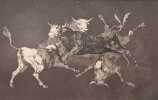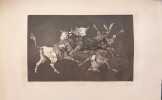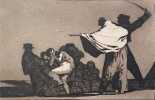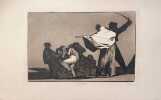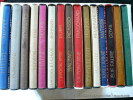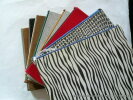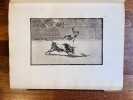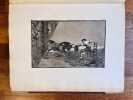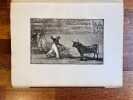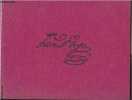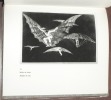60 books for « goya francisco de »Edit
-
Latest
Last month (1)
Last week (1)
-
Century
18th (6)
19th (3)
20th (19)
21st (4)
-
Countries
Belgium (4)
Canada (1)
Denmark (1)
France (45)
Switzerland (9)
-
Syndicate
ALAC (1)
CLAQ (1)
ILAB (30)
NVVA (1)
SLACES (1)
SLAM (23)
Topics
- Autographs (1)
- Bullfighting (11)
- Circus (2)
- Clergy (6)
- Clubs (2)
- Engravings (1)
- Exhibition catalogue (1)
- Fantastic (1)
- Fashion (2)
- First edition (1)
- Germanic languages (1)
- Goya francisco (59)
- History (2)
- Illustrated books (2)
- Lorca fédérico garcia (1)
- Monographs (1)
- Nobility (6)
- Painters (2)
- Picasso (1)
- Rosary (1)
- Roy claude (1)
- Spanish (7)
- Symbolism (1)
Los desastres de la guerra. Colección de ochenta láminas inventadas y grabadas al agua-fuerte. Publicala la Real Academia de Bellas Artes de San Fernando. - [""THE MOST SEARING WORKS OF ART EVER TO DEAL WITH CONFLICT""]
Madrid, 1906. Folio oblong. Bound in a splendid recent full longgrained burgundy morocco binding in pastiche style, with four raised bands to beautifully gilt spine. Boards with gilt ornamental borders and gilt centre-piece. Gilt line to edges of boards and inner gilt dentelles. Marbled end-papers. All leaves re-hinged. Occasional light brownspotting, but overall very nice. Title-page (the version with the second line (beginning ""Colección de Ochenta...) in lower case), 2 pp. of text (dated 1863) + 80 engraved plates (on fine, laid paper measuring 23,4x32 cm.). Plates 17 and 77 have been misbound (the numbers 1 and 7 look almost the same - Harris II:201: ""In some sets this plate has been bound out of order where the number hs been read as 77"""" II:288: ""In some sets this plate has been bound out of order where the number has been read as 17).
A beautiful copy of the splendid fourth edition of Goya's magnificent ""Disasters of War"" - one of the most significant anti-war works of art ever produced - consisting in all 80 plates that were issued. ""The Disasters of War"" constitutes Goya’s political masterpiece, directly inspired by and documenting the horrors he witnessed during the Peninsular War of 1808-14 between Spain and France under Napoleon Bonaparte, the terrible famine in Madrid in 1811-12, and the disappointment at the restoration of the Bourbon monarchy. As such, it is one of the earliest and most important examples of war documentation and remains to this day one of the boldest anti-war statements ever made. This, however, is also the reason why these groundbreaking etchings were not published during Goya’s life-time. It was both too dangerous and too gruesome. As Alastair Sooke puts it, ""[e]ven today it is difficult to look at the Disasters, because Goya catalogues the brutality and fatal consequences of war in such a stark, confrontational and unflinching manner."" (See his article for BBC Culture, 2014). In this seminal series of etchings, Goya not only uses art to comment on politics and the atrocities connected with war, he also pioneers a number of artistic tools. Breaking from painterly traditions, he deviates from the heroics of most previous war art to show us how war can bring out the worst in humanity. He abandons colour in order to show us a more direct truth conveyed by the use of shadow and shade. Also, the fact that he presents the 80 works of art as a collection, together with the harsh, realistic nature of the etchings themselves, connect the images more closely to the art of photography that we are now so familiar with, causing the work as a whole to be viewed as one of the earliest examples of actual first-hand war reportage. The work has been extremely influential, perhaps most famously inspiring Pablo Picasso and Ernest Hemingway (For Whom the Bells Toll). ""There are many contenders for the most powerful example of war art from the past two centuries: Picasso’s Guernica (1937), painted in response to the bombing of a Basque village during the Spanish Civil War, would be an obvious choice. For me, though, nothing quite matches the originality and truth-telling ferocity of the Disasters of War, a series of 80 aquatint etchings, complete with caustic captions, by the Spanish artist Francisco de Goya (1746-1828)."" (Sooke). The execution of the engravings has been dated to a period between 1810 and 1820, but no contemporary edition was made of this spectacular series. ""Possibly by the time they were finished, the war and famine scenes were not of great appeal, and Goya was probably unwilling to risk another financial failure such as he had experienced with the ""Caprichos"". It was a time of stern repression and the publication of the satirican and violently anti-clerical subjects of some of the ""caprichos enfánticos"" would certainly have been dangerous. These facts would account for a postponement of publication. Also, Goya himself tells us that he fell seriously ill in the winter of 1819... and on his recovery he was planning to leave Spain and settle permanently in France. That Goya did not attempt to make an edition of ""Desastres"" in Madrid before leaving for France is borne out by the investigations of Catharina Boelcke-Astor, who showed that the copperplates were stored away in safes by Goya's son Javier, where they remained until the latter's death in 1854. Eventually, in November 1862, they were acquired by the Academia de San Fernando from D. Jaimé Machén for 28,000 reales..."" (Harris I:141). In 1863, the first edition of Goya's seminal work was issued, under the famous title ""Los desastres de la guerra"". In all, 500 copies were issued. A second edition followed in 1892, and a third in 1903. Both of these editions were issued in merely 100 copies. In 1906, the fourth edition appeared, in a number of 275 copies. ""This edition is excellently printed on very suitable papers"" (Harris II: 175) and is considered much superior to the third. A further three editions appeared, in 1923, 1930, and 1937 respectively. ""When Goya had engraved all the plates of the ""Desastres"" he gave his friend, Céan Bermúdez, an album containing a proof set of eighty-five plates, including the eighty plates eventually published as ""Los Desastres de la Guerra"", two plates numbered 81 and 82, which were prepared for the series but not published with it, and the three little engravings of ""prisoners"", which were never intended by Goya for inclusion in a published edition of the series."" (Harris I:140). The first plate prepares the spectator for the contents of the series and can be seen as a sort of frontispiece, plates 2-47 deal mainly with the horrors of the war, plates 48-64 record the terrible famine in Madrid, and the final plates 65-80 constitute the ""Caprichos enfánticos"". "" ""The impact of the scenes is incredible,"" says the independent art historian Juliet Wilson-Bareau, one of the world’s leading Goya experts. ""Each one is a powerful, original work of art in its own right, yet linked to the others with a common theme, including the way their titles - terse comments, questions, or cries of outrage - connect them, and read on from one to another. The grouping of the series into three ‘chapters’ gives the whole a sense of rhythm and purpose."" Goya must have hoped that he would live to see the publication of his Disasters, but the despotic rule of Ferdinand VII made this impossible. ""Under his repressive and reactionary regime,"" Wilson-Bareau explains, ""there was no way that Goya could have published his set of prints that so clearly denounced all violence and all abuse of power."" Still, following their posthumous publication, the Disasters proved enormously influential, inspiring artists including the German Otto Dix as well as Dalí and Picasso - and, more recently, the British brothers Jake and Dinos Chapman, who bought a complete edition of the prints and ‘defaced’ them by adding grotesque, cartoonish faces. Even the war photographer Don McCullin acknowledges a debt: ""When I took pictures in war, I couldn’t help thinking of Goya,"" he has said. The genius of the Disasters is that they transcend particularities of the Peninsular War and its aftermath to feel universal - and modern. Perhaps this is because, as the British writer Aldous Huxley put it in 1947, ""All [Goya] shows us is war’s disasters and squalors, without any of the glory or even picturesqueness."" So should we consider the series as the greatest war art ever created? Wilson-Bareau certainly thinks so. ""For me, yes,"" she tells me. ""I have lived with these prints, which many people consider too shocking, absolutely unbearable, and I find in them - besides the heartbreak and outrage at the unspeakable violence and damage - a great well of compassion for all victims of the suffering and abuses they depict, which goes to the very heart of our humanity."" (From Alastair Sooke's BBC-article). Harris II: 175.
LOS CAPRICHOS.
Madrid. Calcografia Nacional & Real Academia de Bellas Artes de San Fernando. 1996. Deux volumes in-4° (l'un broché, l'autre relié) sous étui imprimé. Un volume, relié, est consacré à une luxueuse reproduction intégrale des 80 eaux-fortes de Goya, précédées de notices explicatives pour chacune d'elles. L'autre volume, broché de 131 pages, se compose de " Una aproximación y tres estudios " : " Aproximación a los Caprichos de Goya ", par Juan Carrete. " El Arte satírico de los Caprichos, con una nueva síntesis de la historia de su estampación y divulgación ", par Nigel Glendinning. " Goya, los Caprichos y el teatro de sombras chinescas ", par Juan Miguel Serrera. " De la imaginación a la realidad : dibujar y grabar el Capricho ", par Jesusa Vega. Sont joints : le livret de présentation de l'éditeur, une invitation à la présentation de l'ouvrage à la Pedrera de Barcelone, un ticket d'entrée à l'exposition de la Sala Gaudí de Barcelone. En parfait état.
Luxueuse édition réalisée pour le 250e anniversaire de la naissance de Francisco Goya.
VERTIGES PARTAGÉS, LOS CAPRICHOS. BENJAMIN / FRANCISCO L. GOYA. Exposition Paris, galerie La Réserve d'Area - Musée national de Port-Royal des Champs - du 18 avril au 30 septembre 2008. Catalogue d'exposition [Signé + dessin autographe de Benjamin Lévesque]
Area 2008 Paris, Area, 2008. Oeuvres de transmutation réalisées par Benjamin Lévesque d'après les "Caprices" de Goya. Petit in-4 broché, 21 x 28 cm., 180 pp. de reproductions en couleurs pleine page. Textes de Goya extraits de ses notes. Présentation de Pierre Descargues. Couverture illustrée à rabats. Exemplaire enrichi d'un dessin et d'un bel envoi autographe signés de Benjamin, au feutre doré. Dernières pages légèrement gondolées, sinon bel exemplaire.
bon
Goya En Las Colecciones Madrilenas: Museo Del Prado, Abril-Junio 1983
BROCHE BON ETAT PLIS SUR DOS ANGLES FROTTES ESPAGNOL. 25x21. 239p. PHOTOS SUR DEMANDE.Goya en las colecciones madrilenas: Museo del Prado, , Goya, Francisco Broché, 1983
Merci de nous contacter à l'avance si vous souhaitez consulter une référence dans notre boutique à Authon-du-Perche.
Goya, les peintures noires.
Paris William Blake & Co. 2006 1 vol. broché in-8, broché, couv. illustrée à rabats, 177 pp., reproductions en noir. Première édition, avec un envoi autographe signé de l'auteur. Très bon état général.
[Eau-forte originale] Les Jeunes, d'après Goya.
Dimensions : 567 x 383 mm (marges comprises).
Belle eau-forte originale avec remarque et monogamme, signée et justifiée (46 / 300) à la mine de plomb en marge inférieure. ''Léon Salles fut l'élève de d'Auguste Boulard. Sociétaire des Artistes Françias depuis 1893, il figura au Salon de ce groupement ; mention honorable en 1894, médaille de troisième classe en 96, médaille de bronze en 1900 à l'Exposition Universelle''. (in Bénézit). Bénézit IX, Dictionnaire des peintres, p. 250 - Delteil II, Manuel de l'amateur d'estampes, p. 434. Infimes altérations en marge de la planche. Du reste, très belle condition.
Goya dessins.
Paris Chêne, coll. "15/21" 1975 1 vol. broché in-8, broché, couverture illustrée à rabats, 47 pp. et 96 reproductions en noir et à pleine page. A l'état de neuf.
"Lluvia de Toros - Pluie de Taureaux".
1877 4 Estampe signée en bas à gauche dans la cuvette, titrée, Paris, Liénrard-L'Art, 1877, 23 x 32,5 cm. à vue, feuille 32,5 x 50 cm. (format de la feuille).
Planche pour Los Proverbios de Francisco Goya y Lucientes (1746 - 1828), issue d'un tirage posthume de la première édition des planches supplémentaires publiées en 1877 dans l'Art. Beau tirage à grandes marges sur papier Vergé. Brunissures marginales n'atteignant pas l'estampe.
"Que Guerrero ! - Quel Guerrier !".
1877 4 Estampe signée en bas à gauche dans la cuvette, titrée, Paris, Liénrard-L'Art, 1877, 23 x 32,5 cm. à vue, 30,5 x 40.8 cm. (format de la feuille).
Planche pour Los Proverbios de Francisco Goya y Lucientes (1746 - 1828), issue d'un tirage posthume de la première édition des planches supplémentaires publiées en 1877 dans l'Art. Beau tirage à grandes marges sur papier Vergé. Brunissures marginales n'atteignant pas l'estampe.
Master or etching - FRANCISCO DE GOYA.
London, The stutio limited, 1927 ; in-4 , 10-15 pp., cartonnage de l'éditeur. NUMBER FIFTEEN - introduction by Malcolm C. Salaman-OBLONG.
NUMBER FIFTEEN - introduction by Malcolm C. Salaman-OBLONG.
LES CAPRICES
Paris Editions Cercle d'Art 1960 in 4 (27,5x21,5) 1 volume reliure toilée de l'éditeur sous jaquette illustrée, 29 pages, suivies des reproductions horrs-texte (légendées en regard) des 80 planches des ''Caprices'' de Goya, et de 16 pages (titres,commentaires de Goya et notes). Bel exemplaire ( Photographies sur demande / We can send pictures of this book on simple request )
Très bon Jaquette en très bon état Couverture rigide
"Goya : hommages : les années bordelaises, 1824-1828 : présence de Goya aux XIXe et XXe siècles. Exposition, Bordeaux, Galerie des beaux-arts, 6 mars-6 mai 1998. Catalogue établi sous la direction de Francis Ribemont et Françoise Garcia ; avec les contributions de Bernard Antoniol, Jeannine Baticle, Valeriano Bozal (---) préface, Alain Juppé, introduction, Henry-Claude Cousseau. Bordeaux : Musée des beaux-arts de Bordeaux, 1998"
1 volume in-4° broché, couverture illustrée à rabats, 236 p., illustrations. Très bel état.
Phone number : 06.31.29.75.65
Goya Dans Les Collections Suisses [Paperback]
CATALOGUE DE L'EXPOSITION DE 1982. TRES BON ETAT. PHOTOS SUR DEMANDE
Merci de nous contacter à l'avance si vous souhaitez consulter une référence dans notre boutique à Authon-du-Perche.
Que Guerrero. (Quel guerrier). L'Art. Radierung und Aquatina. Goya inv. et sc. F(ran)çois Liénard Imp. Paris
(1877). Blattrösse: 28,5x42,8 cm. Montiert auf Karton unter Passepartout (41x55 cm).
Delteil 220 II. - Eine der vier bisher unveröffentlichten Radierungen, die ursprünglich für die Serie «Los Proverbios» geschaffen wurde. 1877 erschien sie erstmals in „L'Art. Revue hebdomadaire illustrée». - Gebräunt und im Rand leicht fleckig.
Les dessins de Goya.
Fribourg. Office du Livre. 1973-1975. In-4°. 656 p. avec 481 illustrations en noir et blanc; 581 p. avec 9 planches en couleurs et 398 illustrations en noir et blanc. Originalleinwand mit Schutzumschlag.
Volume I: Les Albums. Préface de Xavier de Salas. - Volume 2: Dessins pour Peintures. Dessins pour les cartons de tapisserie. Dessins pour Gravures. Dessins pour les gravures d'après Vélasquez. Dessins pour les Caprices. Portraits d'artistes espagnols pour le Dictionnaire de Ceán Bermúdez. Dessins pour les Désastres de la Guerre. Dessins pour la Tauromachie. Dessins pour les Disparates. Le Miroir Magique. Dessins d'après Flaxman. Les Portraits de famille. Dessins divers. - Avec une bibliographie.
Los Proverbios de Goya, introduccion por Xavier de Salas
Barcelona Editorial Gustavo Gili 1982
in-folio à l'italienne, 33 x 45cm, 2f., viii p. suivi du fac-similé de l'édition de Madrid 1864, et des planches publiées par la revue «L'Art» de Paris, 22 planches en tout. :: 3e tirage de cette grande édition (une autre à la même date, fait 18 x 35cm seulement). :: Toile de l'éditeur, illustrée. Bon état.

(CLAQ, ALAC)
Phone number : 1 514 820 2324
Les désastres de la guerre. Illustrations de Goya . Collection Les peintres du livre .
Paris, Editions L.C.L., 1966, in-4, Relié sous étui éditeur. (23x21cm), Bel exemplaire sans défaut. 42 illustrations à pleine page.
La tauromaquia [Hardcover]
Club Français du Livre - 1963 Relié format à l'italienne bon état .Ex. numéroté. Contenu propre .209 pages . 1963. La tauromaquia
Merci de nous contacter à l'avance si vous souhaitez consulter une référence dans notre boutique à Authon-du-Perche.
Tauromachia.
München, Hugo Schmidt verlag, 1923. In-folio de [4]-16-[1] pages et 43 feuillets, demi-vélin à coins, dos lisse, tête dorée.
Édition fac-similé très bien imprimée sur vélin fort. Tirage à 500 exemplaires numérotés, le nôtre n° 142. Elle contient les 33 planches de la première édition et les planches ajoutées dans les éditions suivantes (7+3). Minime choc à un coin.
La Tauromaquia
Le club français du livre. 1963. In-4. Relié toilé. Etat d'usage, Couv. convenable, Dos satisfaisant, Quelques rousseurs. 209 pages - nombreuses illustrations en noir et blanc hors texte. Avec rhodoïd.. . . A l'italienne. Classification Dewey : 791.8-Tauromachie
Intro, étude et présentation par Enrique Lafuente Ferrari. Trad. de Mathilde Pomès. N°7341/10.000. Classification Dewey : 791.8-Tauromachie
La Tauromaquia. Edición facsimil... del prof. Enrique Lafuenta Ferrari.
Barcelona, Editorial Gustavo Gili S.A,, 1974, 33.5x46.5 cm, 30 p. (text) + 33 full page ill. + 3 plates (with 4 ill. each), publisher’s pictorial clothbinding, publisher’s plastic jackett. Fine copy.
Image disp.

(SLACES, NVVA)
Phone number : 41 (0)26 3223808
Caprices Disparates
Le club français du livre. 1960. In-8. Relié. Bon état, Couv. convenable, Dos satisfaisant, Intérieur frais. 24 pages + 102 eaux fortes reproduites en héliogravures + XV pages. 1 signet conservé.. . . . Classification Dewey : 750-La peinture et les peintres
Avant-propos de Roy Claude. Classification Dewey : 750-La peinture et les peintres
CAPRICES - DISPARATES
Club français du livre 1960 Paris, Le Club français du Livre, 1960. Comprenant 102 eaux-fortes reproduites en héliogravure, précédées d'un à-propos par Claude Roy. Table des planches et notes par Jean Adhémar. Grand in-8, 18 x 21 cm., 24 pp.- 102 pl. - XVI pp. Reliure pleine feutrine gris moucheté, pièces de titre de papier vergé contrecollées sur le premier plat et au dos, rhodoid. Maquettes de Jacques Daniel. Édition hors commerce numérotée et réservée aux membres du Club français du Livre. Très bon état, bien complet avec son rhodoid.
très bon
Les Caprices.
2005 Couverture rigide Paris, Les éditions de l'Amateur, 2005. In-4, cartonnage éditeur sous jaquette illustrée à rabats, quelques marques marginales sur les plats. 204 pages, 85 planches en noir hors-texte. Présentation de Jean-Pierre Dhainault. Bel état des planches et du texte, bon exemplaire.
Très bon
Los Caprichos
Dover publications. non daté. In-8. Broché. Bon état, Couv. convenable, Dos satisfaisant, Intérieur frais. 150 pages environ augmentées de nombreux dessins en noir et blanc hors texte.. . . . Classification Dewey : 420-Langue anglaise. Anglo-saxon
Texte écrit en anglais. Classification Dewey : 420-Langue anglaise. Anglo-saxon
 Write to the booksellers
Write to the booksellers
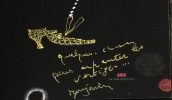

![[Eau-forte originale] Les Jeunes, d'après Goya.. SALLES (Léon Auguste) - GOYA (Francisco, d'après).](https://static.livre-rare-book.com/pictures/BLS/13369_1_thumb.jpg)
